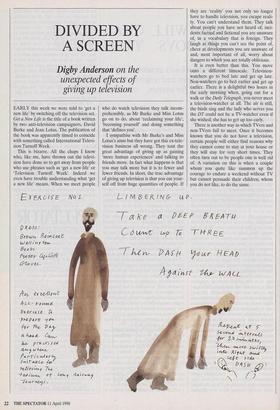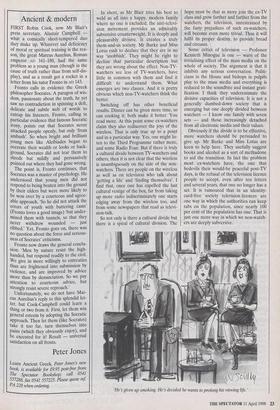DIVIDED BY A SCREEN
Digby Anderson on the
unexpected effects of giving up television
EARLY this week we were told to 'get a new life' by switching off the television set. Get a New Life is the title of a book written by two anti-television campaigners, David Burke and Jean Lotus. The publication of the book was apparently timed to coincide with something called International Televi- sion Turnoff Week.
This is bizarre. All the chaps I know who, like me, have thrown out the televi- sion have done so to get away from people who use phrases such as 'get a new life' or `Television Turnoff Week'. Indeed we even have trouble understanding what 'get a new life' means. When we meet people who do watch television they talk incom- prehensibly, as Mr Burke and Miss Lotus go on to do, about 'reclaiming your life', `becoming yourself' and doing something that 'defines you'.
I sympathise with Mr Burke's and Miss Lotus's aims but they have got this ex-tele- vision business all wrong. They tout the great advantage of giving up as gaining `more human experiences' and talking to friends more. In fact what happens is that you may talk more but it is to fewer and fewer friends. In short, the true advantage of giving up television is that you cut your- self off from huge quantities of people. If they are 'reality' you not only no longer have to handle television, you escape reali- ty. You can't understand them. They talk about people you have not heard of, inci- dents factual and fictional you are unaware of, in a vocabulary that is foreign. They laugh at things you can't see the point of, cheer at developments you are unaware of and, most important of all, worry about dangers to which you are totally oblivious.
It is even better than this. You move onto a different timescale. Television- watchers go to bed late and get up late. Non-watchers go to bed earlier and get up earlier. There is a delightful two hours in the early morning when, going out for a walk or the Daily Telegraph, you never meet a television-watcher at all. The air is still, the birds sing and the lady who serves you the DT could not be a TV-watcher even if she wished; she has to get up too early, There is another way in which TVers and non-TVers fail to meet. Once it becomes known that you do not have a television, certain people will either find reasons why they cannot come to stay at your house or they will stay for very short times. They often turn out to be people one is well rid of. A variation on this is when a couple whom you quite like summon up the courage to endure a weekend without TV but cannot persuade their children, whom you do not like, to do the same. In short, as Mr Blair tries his best to weld us all into a happy, modern family where no one is excluded, the anti-televi- sion movement provides an admirably subversive counterweight. It is deeply and pleasurably divisive. It creates a truly them-and-us society. Mr Burke and Miss Lotus rush to declare that they are in no way 'snobbish'. They might be right to decline that particular description but they are wrong about the effect. Non-TV- watchers see less of TV-watchers, have little in common with them and find it difficult to understand them. What emerges are two classes. And it is pretty obvious which non-TV-watchers think the better.
Switching off has other beneficial results. Dinner can be given more time, so can cooking it; both make it better. You read more. At this point some ex-watchers claim they also rediscover the joys of the wireless. That is only true up to a point and in a particular way. Yes, one might lis- ten to the Third Programme rather more, and some Radio Four. But if there is truly a cultural divide between TV-watchers and others, then it is not clear that the wireless is unambiguously on the side of the non- watchers. There are people on the wireless as well as on television who talk about `getting a life' and 'finding themselves'. I find that, once one has expelled the last cultural vestige of the box, far from taking up more radio indiscriminately one starts edging away from the wireless too, and from some newspapers that read as televi- sion-talk.
So not only is there a cultural divide but there is a spiral of cultural division. The hope must be that as more join the ex-TV class and grow further and further from the watchers, the television, unrestrained by the fusty prejudices of such ex-watchers, will become even more trivial. Thus it will fulfil its proper destiny, to provide bread and circuses.
Some critics of television — Professor Kenneth Minogue is one — warn of the trivialising effect of the mass media on the whole of society. The argument is that it inhibits any serious conversation. Politi- cians in the House and bishops in pulpits play to the mass media and everything is reduced to the soundbite and instant grati- fication. I think they underestimate the divisive capacities of television. It is not a generally dumbed-down society that is emerging but one deeply divided between watchers — I know one family with seven sets — and those increasingly detached from all electronic media and their values.
Obviously if the divide is to be effective, more watchers should be persuaded to give up. Mr Burke and Miss Lotus are keen to help here. They usefully suggest books and alcohol as a sort of methadone to aid the transition. In fact the problem most ex-watchers have, the one that bedevils their would-be peaceful post-TV days, is the refusal of the television licence people to accept, even after ten letters and several years, that one no longer has a set. It is rumoured that in an identity- card-free society television licences are one way in which the authorities can keep tabs on the population, since nearly 100 per cent of the population has one. That is just one more way in which we non-watch- ers are deeply subversive.
He's given up smoking. He's decided he wants to prolong his viewing life.'



































































 Previous page
Previous page